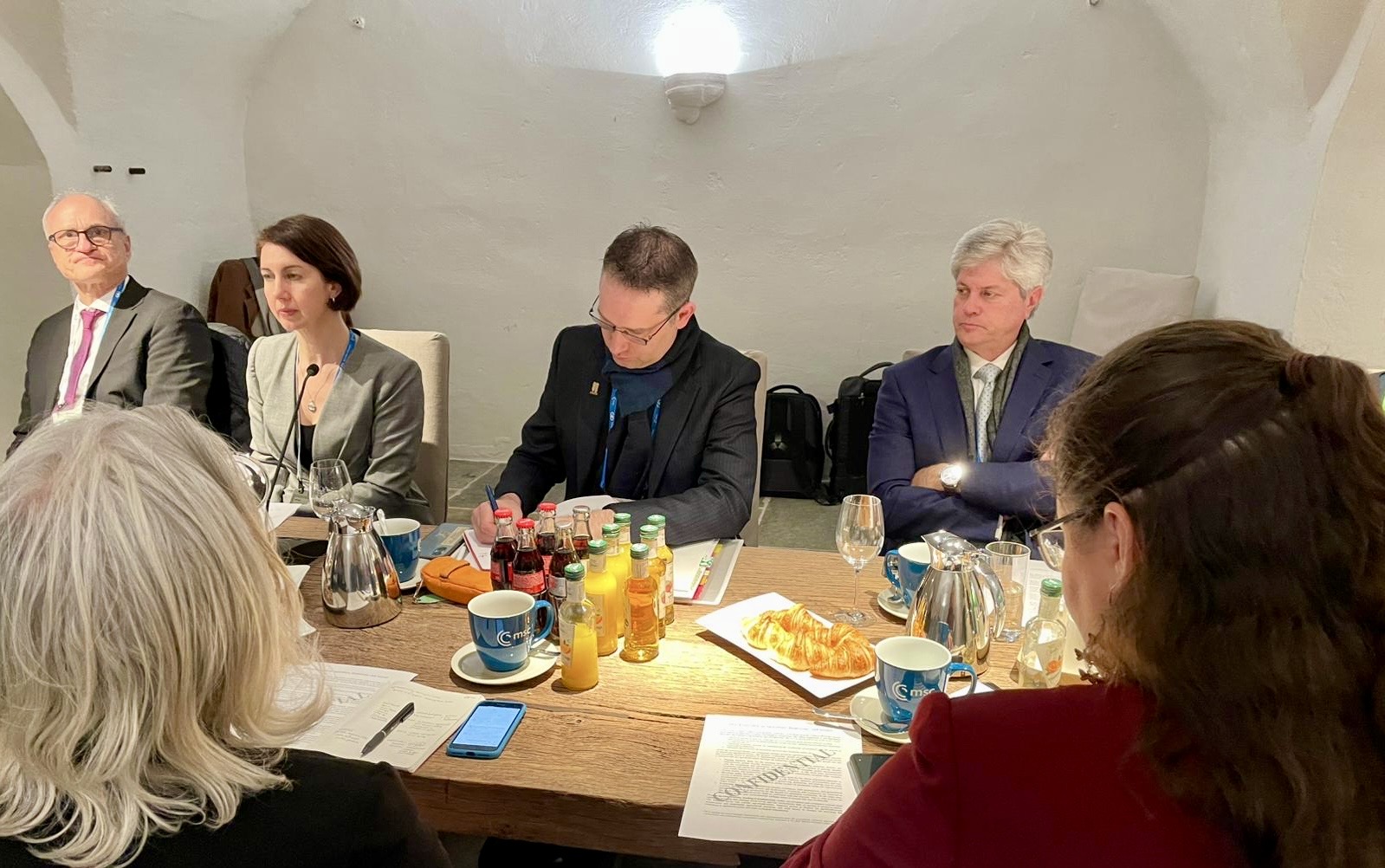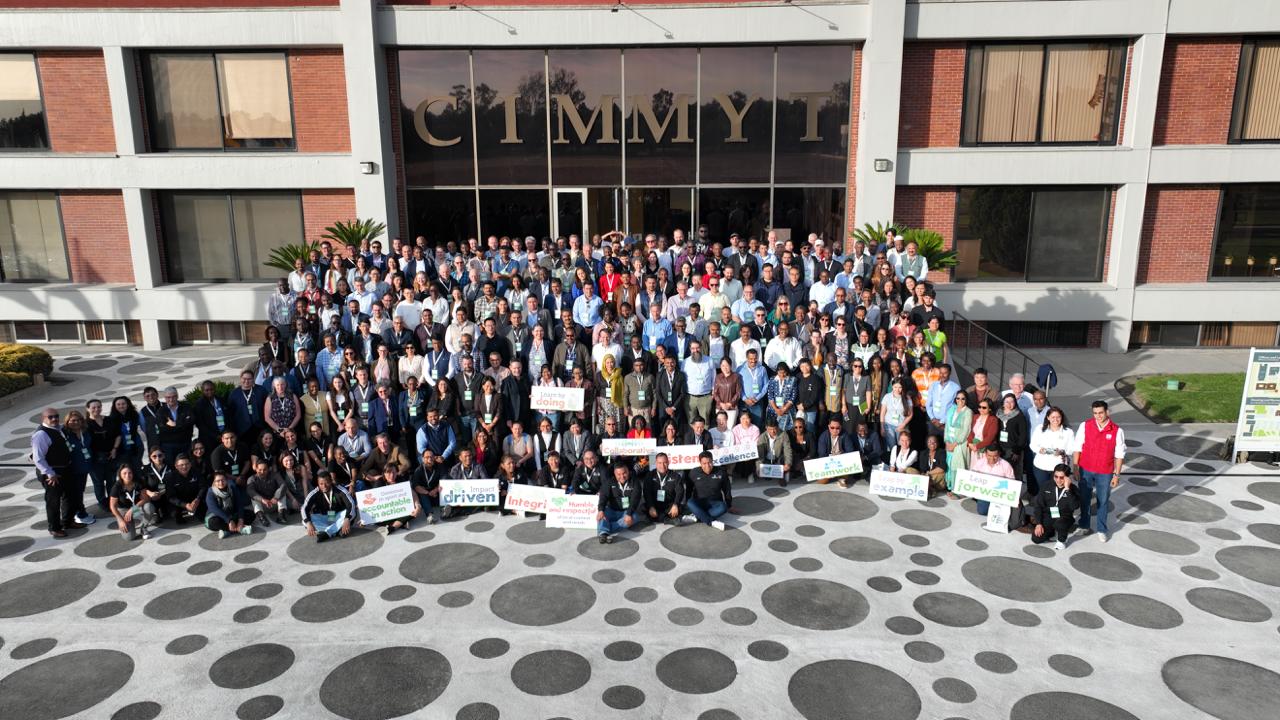“What I find most appealing about my role is that I have a chance to engage with partners from all over the world with one shared vision around addressing global food security,” Mashal said in her introduction.
The session started with Bram Govaerts, Director General of CIMMYT, introducing Mashal. “Mashal brings deep experience and global perspectives to the organization. She has provided incredible leadership during a period of tremendous growth for the World Food Prize Foundation, especially its programs, including the youth programs. There is a lot to learn from her outstanding leadership,” he said.
Four takeaways for navigating careers
Mashal connected with the audience by sharing important takeaways to build impactful careers: “First, you don’t have to be a scientist to work in global food security; second, you can find your calling and passion much later in life.”
Raised with a very diverse upbringing—born in Pakistan, and having lived in Tanzania, the Philippines, and Thailand—Mashal saw a lot of hunger and poverty around her, although she did not experience it personally. It wasn’t until she came to Des Moines, Iowa, that she truly embraced the significance of food security and found her calling at the age of 36.
With a background in healthcare and having worked for non-profits in the healthcare space, Mashal shared how, when she finally arrived at the World Food Prize in September 2008—recruited and mentored by Ambassador Ken Quinn—she knew what she wanted to do for life. “Ambassador Quinn took a chance on me—someone with no background or professional education in agriculture or food security,” she said.
The third takeaway came from an experience when Mashal, soon after joining the Foundation, was asked to arrange seating for the signature event, the Borlaug Dialogue, anticipated to attract 12,200 attendees from across the globe to Des Moines.
“Ambassador Quinn said something to me then that has always stayed with me—where you seat people and how you make them feel in that moment is what you are remembered for. So, that is takeaway number three: the importance of relationship building,” she said.
The fourth takeaway was that no job is too small. “Here I was with a master’s degree in healthcare administration and ten solid years of work experience, and I was doing seating! I learned in that moment that to be an empowering leader, you need to understand every segment of your organization and embrace every aspect of the work that you are asking your team to do,” she said.
The three pillars: Recognize and award impact, provide platforms for dialogue, inspire young minds
Mashal shared that the Foundation operates on three key pillars. The first is recognizing individuals who enhance the global food supply and availability through the World Food Prize, a prestigious $500,000 award. It celebrates exceptional individuals in fields such as soil science, food technology, and nutrition. Since its establishment by Dr. Norman E. Borlaug in 1986, the Foundation has honored 54 laureates from diverse backgrounds and disciplines, marking its 38th anniversary. “I might be a little biased, but I’m told that the World Food Prize award ceremony far exceeds the Nobel Prize ceremony in Oslo,” she said.
Additionally, the Dr. Norman Borlaug Award for Field Research and Application, endowed by the Rockefeller Foundation, honors outstanding science-based contributions to global agriculture and food production made by individuals under 40. “These are people who emulate the same intellectual courage and determination in fighting global hunger and poverty that Dr. Borlaug demonstrated as a young scientist working in Mexico in the 1940s and ’50s,” said Mashal.
Secondly, the Foundation facilitates discussions on global food security and agriculture. Its flagship event, the Borlaug Dialogue, is held every October in Des Moines. In 2023, the event attracted over 14,400 participants from 83 countries, representing 600 organizations. “It’s about bringing people together, creating great energy and interactions to uplift these conversations, and collectively making progress in the global food security arena,” she said, adding how in March 2024 they launched a new series—DialogueNEXT—to focus on the significant role of women in agriculture and agricultural innovation.
The third focus area of the World Food Prize is youth programs aimed at empowering the next generation of agricultural innovators and creating a pipeline of problem solvers around global food security. “It is about how we mentor young minds to solve the food security issues of tomorrow,” said Mashal. Various youth initiatives—a program where students across the globe research a global challenge, a global youth institute where a sub-sect of students present their papers to World Food Prize laureates, and an international internship that facilitates students visiting research centers around the world—empower young people to change the world.
Preserving the legacy of learning
Mashal shared how, for two years, she took on the role of construction manager, transforming a 100-year-old public library in Des Moines into the global headquarters for the World Food Prize Foundation—the Dr. Norman E. Borlaug World Food Prize Hall of Laureates.
“Ambassador Quinn and I worked together to preserve the historic identity of the building while further elevating the legacy of our founder. It was a 30-million-dollar restoration project, giving the historic building a new sense of purpose and identity. It’s now our home, where we welcome over 20,000 people each year,” said Mashal.
Mashal shared how the installed artwork and the energy-efficient architecture “tell the story of agricultural and humanitarian heroes, of global food security, of the World Food Prize laureates and their collective impact, and the role of women in agriculture.”
Need for mindset change early on, exposure, diverse perspectives
In a follow-up Q&A session with CIMMYT’s Claudia Velasco Ruiz, Mashal shared her insights on gender equality, work-life balance, the role of networking and mentorship, and more.
To empower women in agriculture and related fields, she shared that it is important to have conversations and forums, such as Catalysts of Change: Women Leaders in Science, where topics like equal pay and diversity and inclusion policies in the workplace should be discussed.
To foster gender equity, Mashal shared that it is essential to begin education, and mindset shifts early in life for both young girls and boys. “Girls should be encouraged to dream big, while boys must learn to respect those perspectives.” She shared how the Foundation prioritizes gender equality, with approximately 90% of the staff being women—women who drive programs and make decisions. In the youth programs, 70% of participants are young women, two-thirds of whom pursue studies in STEM fields. However, challenges exist for women in agriculture, primarily due to a lack of exposure. “Exposure is front and center and incredibly critical at that early stage of learning and professional development,” she noted.
About diverse perspectives, Mashal said that “everyone’s opinion matters.” On the topic of work-life balance, she expressed, “Life comes first, as passionate as we may be about our professional growth and career.”
Mentorship and networking are the most important roles we can play as leaders; she shared.
A leadership style she finds compelling is “one’s ability to connect and build relationships with people of all ages and diverse backgrounds; to be able to connect genuinely and authentically.”
Her advice to young people is to “always be open to new opportunities and be flexible about where your career path may take you.”

 Climate adaptation and mitigation
Climate adaptation and mitigation 
